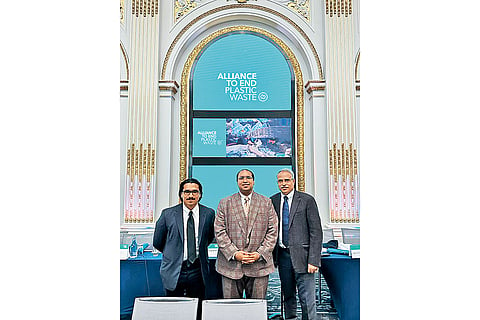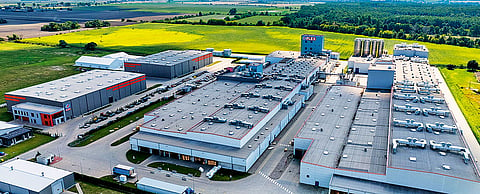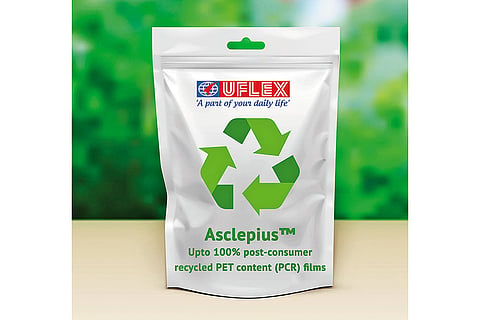Uflex: At The Forefront Of A Green Packaging Revolution
Jeevaraj Gopal Pillai highlights how UFlex is fuelling a shift toward a circular economy in packaging through sustainable solutions led by technology and innovation—demonstrating strong environmental stewardship, in a conversation with Aditi Chakraborty
How has UFlex grown to become India’s largest multinational in flexible packaging solutions?
UFlex’s success story is rooted in a strong vision of innovation, sustainability, and global expansion. Since our inception in 1985, we have grown into India’s largest multinational flexible packaging company, with 16 manufacturing facilities across nine countries, including India, the UAE, Mexico, Egypt, the USA, Poland, CIS, Nigeria, and Hungary, by focusing on trust, value creation for customers, quality innovation, and customer satisfaction.
What are the key milestones that showcase UFlex’s leadership in sustainability?
UFlex is the first company in the world to conceptualize the recycling of multi-layer mixed plastic waste (MLP). This milestone earned us global recognition at the Davos Recycle Forum in 1995, setting the tone for continued efforts in plastic waste management.
UFlex is also the first Indian company to receive U.S. FDA certification for food-contact recycled polyethylene (rPE) and recycled polypropylene (rPP). It stands as the only Indian flexible packaging company with food-grade recycling certifications across PET, PE, and PP. Over the years, we have also focused on recycling and upcycling post- consumer plastic waste through one of our global sustainability initiatives, Project Plastic Fix. We invest in Plastic Material Passports, blockchain traceability, and digital watermarking to ensure compliance, transparency, and combat greenwashing.
We have invested in advanced technologies like enzymatic delamination for aseptic packaging recycling. UFlex’s enzyme-based Enzymatic Delamination Technology revolutionizes recycling of multi-layer aseptic packaging (MLAP)—traditionally considered non-recyclable due to its composite layers of paper, polyethylene, and aluminum foil. This innovation enables recovery of high-quality paper pulp for printable paper and aluminum foil for products like metalized roof sheets, partition boards, and more. These recovered materials offer durable, cost-effective, and energy-efficient alternatives in construction, showcasing a successful waste-to-resource model beyond packaging.

Tell us more about the range of sustainable packaging products and solutions offered by UFlex.
We are actively expanding our portfolio of sustainable packaging products and solutions. Our strategy focuses on developing innovations that deliver tangible environmental and commercial value, aligning closely with global sustainability expectations. One of the examples of our sustainable product range is Asclepius™, a barrier BOPET film made with up to 100% post-consumer recycled content, which helps reduce reliance on virgin plastic.
We have introduced water-based inks that help reduce the environmental footprint of packaging production while enhancing recyclability . We manufacture flexible tubes for the beauty and cosmetics industry using post-consumer recycled materials. Our aseptic packaging brand, Asepto, incorporates 5% certified recycled polymers.

How is UFlex leading strong circular economy initiatives?
UFlex has built one of the most advanced recycling ecosystems in the packaging sector, incorporating sustainable practices through all stages of operations, including design, production, and waste management. In line with our commitment to support the Government of India’s Extended Producer Responsibility (EPR) legislation, we have recently announced a significant investment of INR 317 crore to strengthen our recycling capabilities. This includes the establishment of two new recycling plants in Noida. The Indian government has set ambitious targets for the collection, recycling, reuse, and use of recycled content in plastic packaging to promote sustainable packaging. Our enhanced recycling operations will empower brand owners to meet their EPR commitments and set a global benchmark for sustainable packaging.
At present, UFlex has recycling plants in India, Poland, Egypt, and Mexico, processing post-consumer multi-layered mixed plastic (MLP), multi-layer aseptic packaging (MLAP), and polyethylene terephthalate (PET) waste. Our global recycling capacity is more than 72,300 MTPA, and another 39,600 MTPA is scheduled to be commissioned in FY26. To date, we’ve recycled more than 5 billion post- consumer PET bottles. In FY25 alone, we recycled 8,200 MTPA of multi-layer plastic waste, reinforcing our sustainability goals.
One of our most recent breakthrough innovations is the “single-pellet solution”— that integrates 30% or more recycled PET with virgin PET to create food-grade packaging that retains high clarity, strength, and reduced acetaldehyde content. Importantly, it works seamlessly with existing PET manufacturing lines, allowing brands to shift to circular packaging without additional infrastructure costs. This solution significantly reduces the carbon footprint of PET packaging by lowering reliance on virgin plastic materials, contributing directly to our sustainability goals and the global push for a circular economy.

How is UFlex aligning with UN sustainable development goals?
At UFlex, sustainability drives our innovation. We’re targeting to be carbon-neutral and have launched initiatives aligned with key SDGs. Through Project Plastic Fix, we recycle post-consumer PET and multi-layer plastic. We’re cutting carbon emissions via energy-efficient tech and waste-to-energy solutions like pyrolysis. Our recycling efforts also play a critical role in preventing plastic waste from entering water bodies, thereby helping preserve marine ecosystems. We support biodiversity through rainwater harvesting and tree plantation drives. In addition, we continue to strengthen our impact through strategic partnerships with the Indian Institute of Packaging (IIP) and the Alliance to End Plastic Waste, amongst others, promoting recycling awareness and driving sustainable innovation.
How does UFlex contribute to the Government of India’s sustainability initiatives and policies?
Since inception, we have focused on indigenous innovation, world-class manufacturing, and global competitiveness. Through our sustainable practices, advanced R&D, and robust supply chain integration, we play a significant role in strengthening India’s manufacturing capabilities and self-reliance.
We, along with other industry players, actively engage with government bodies such as FSSAI and BIS to help develop the necessary guidelines for the safe and sustainable use of recycled content in food packaging in India. UFlex continues to support the government’s EPR framework and advocates for enhanced guidelines to facilitate the recycling of all plastic packaging materials. As a company, we will continue to invest in innovative solutions and integrate AI to shape a sustainable future.